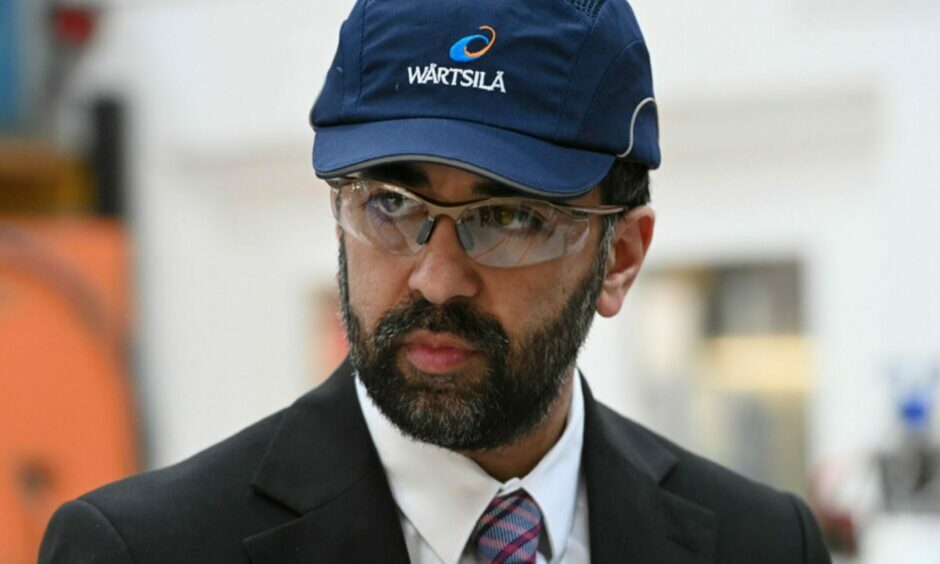
Humza Yousaf has been named leader of the Scottish National Party and the energy industry is calling for the incoming first minister to not leave oil workers “high and dry”.
Dundee-based Humza Yousaf triumphed over Highlander Kate Forbes with 52% of the vote among SNP members and is now ready to take over from Nicola Sturgeon.
Russell Borthwick, chief executive of Aberdeen & Grampian Chamber of Commerce offered “Many congratulations to Humza Yousaf as he becomes the new leader of the SNP.”
He said: “We hope, with his appointment as First Minister this week, that we will see a reset in the strained relationship between business and government with a renewed focus upon economic growth, job creation, driving productivity and ensuring that we harness the skills and innovation of our business community to ensure that Scotland flourishes.
“We were encouraged during the campaign by Mr Yousaf’s ambition to turn the North East from a region of enormous renewable potential to a ‘genuine renewable superpower’.
“That must, however, be part of a genuine plan for a transition that doesn’t leave oil and gas workers high and dry in the short term, before the jobs in low carbon industries are rolled out.
“Government has a role here in policymaking and investment, but also in terms of knowing when to step aside and let business get on with the job.
“Now the rough and tumble of the leadership election has passed, and the serious business of governing Scotland begins, we hope to welcome the new First Minister to the North East very soon — and very often — to listen to and deliver upon the priorities of our business community.”
Driving ‘high-value jobs’
Yousaf recently visited the north-east of Scotland, meeting with external relations director for Offshore Energies UK (OEUK), Jenny Stanning, as well as OEUK member Wartsila, a manufacturing and servicing company.
Trade body OEUK’s chief executive, David Whitehouse commented on Yousaf’s appointment, saying: “Energy policy is a big opportunity to drive high value jobs and growth for Scotland.
“Our rich heritage from oil and gas and Scotland’s supply chain puts us in a strong position to seize the opportunity.
“So I’m looking forward to a highly collaborative relationship and building exciting new partnerships between government and industry for the good of Scotland and the wider UK.
“Our new Business Outlook report, published tomorrow, shows how we can lead the world if we nurture today’s homegrown energy production and give people certainty to carefully invest in tomorrow’s technologies and talent.’’
‘Delivering affordable energy’
The Net Zero Technology Centre (NZTC), based in Aberdeen, says it “looks forward to working in partnership with the new First Minister and Scottish Government.”
The green energy organisation is confident as Yousaf has shown interest in green technology.
Colette Cohen, chief executive of NZTC commented: “We welcome the commitments made by Humza Yousaf in recent weeks, committing to delivering affordable energy as part of transitioning to a net zero future.
“With continued support from government, NZTC can play a central role working with industry to deliver sustainable economic growth for Scotland.”
Making oil and gas a ‘central pillar’ of Yousaf’s government
Davis Larssen, chief executive of energy services firm Proserv, is calling for Mr Yousaf’s government to recognise North Sea oil and gas as a “central pillar” of both energy security and the transition to net zero.
Mr Larssen penned an op-ed with messages for the new first minister, in which he wrote: “The reality is this is not a binary choice between oil and gas and new energies.
“Our ability to accelerate new energies is inextricably reliant on drawing upon the critical mass of skills, infrastructure and financial capital build up through 50 years of a world-class oil and gas industry.
“Therefore, we must have greater cross-party agreement and commitment recognising that North Sea oil and gas must remain a central pillar, not only to support energy security in the mid-term but to drive much of the funding to unlock the technologies of a clean energy future.
“Energy policy is a complex area where devolved and reserved priorities are interwoven and there is therefore a strong case to be made for taking the sharp end of politics out of it.
“A just and balanced transition should be underpinned by a UK wide strategic approach where possible in order to safeguard the skills accrued in the hydrocarbon industry, particularly in North East Scotland, over the past generations.”
Recommended for you


 © PA
© PA © Supplied by Kenny Elrick/DC Thom
© Supplied by Kenny Elrick/DC Thom © Supplied by NZTC
© Supplied by NZTC © Supplied by Proserv
© Supplied by Proserv